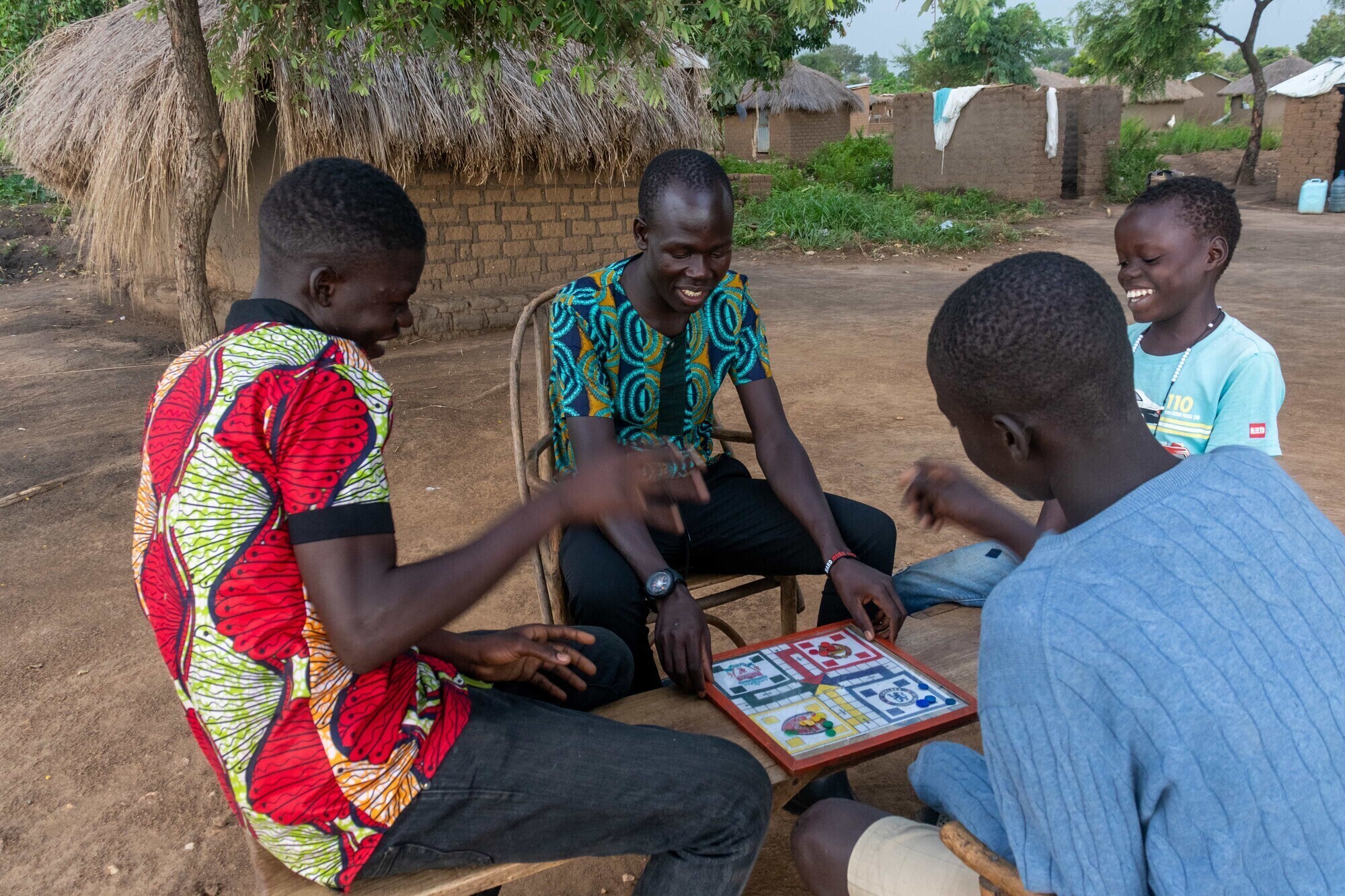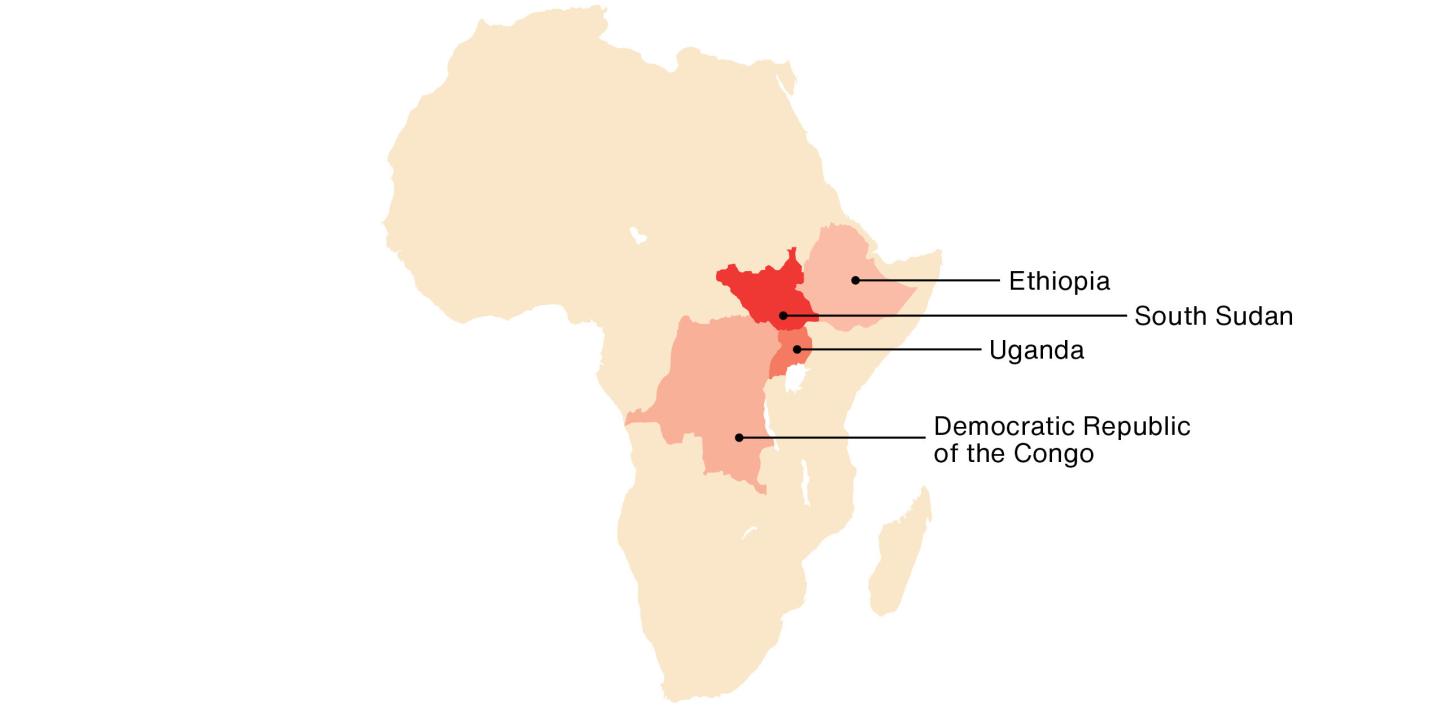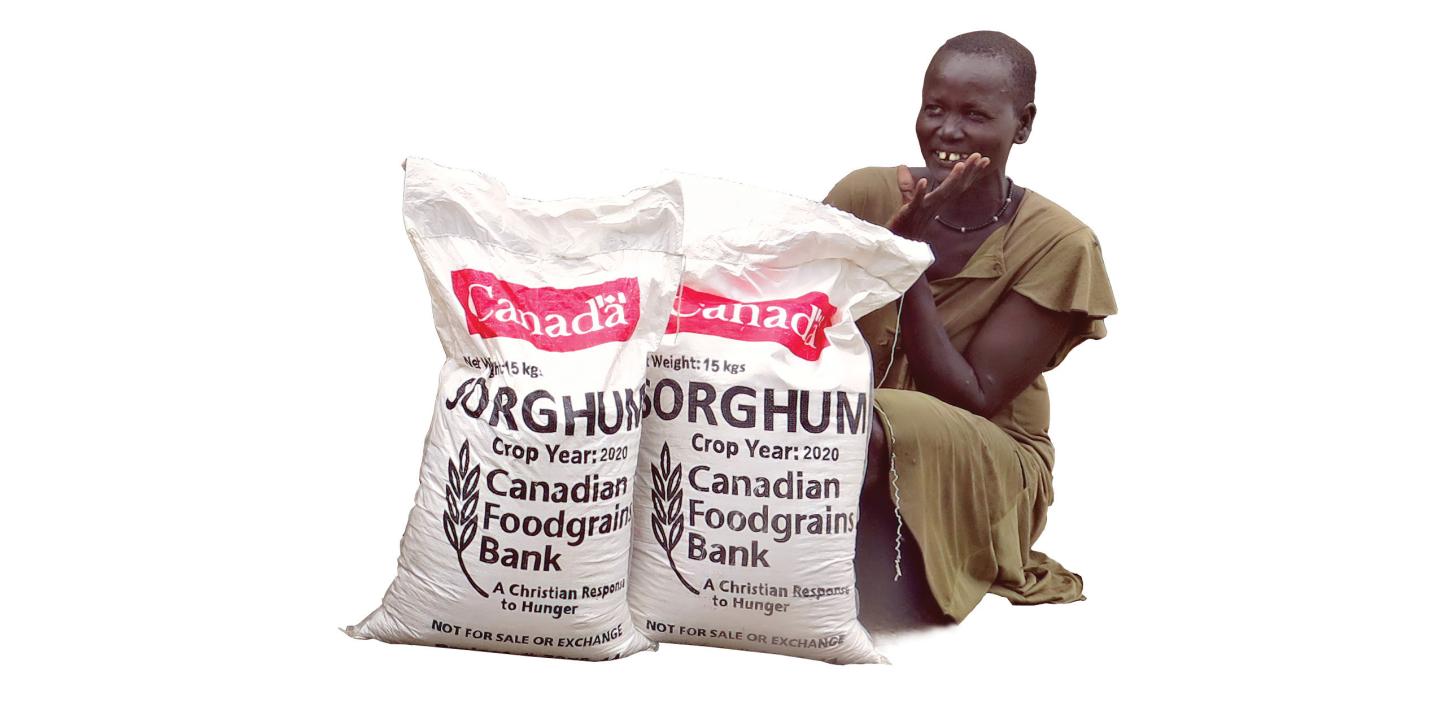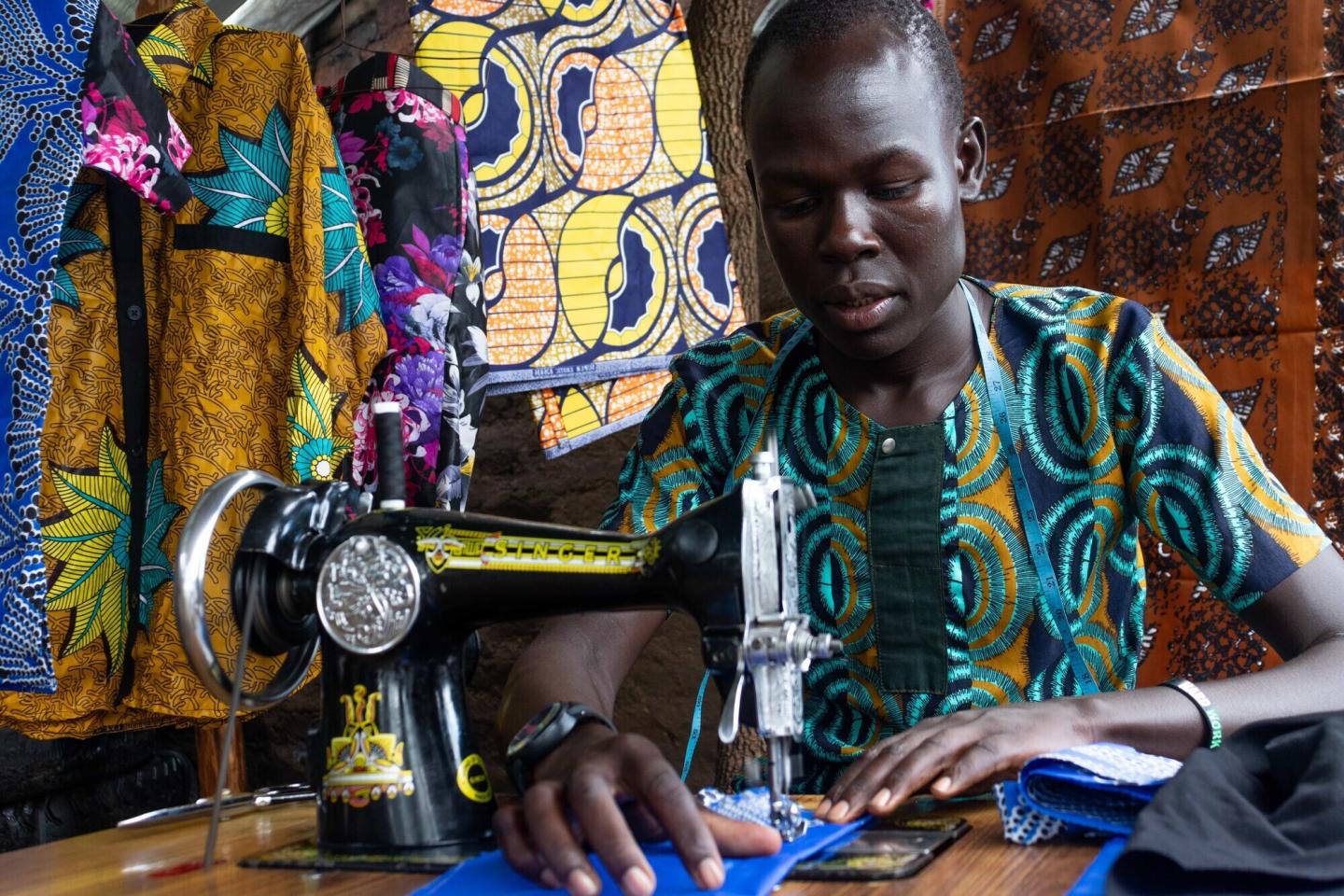New life after leaving home
Within South Sudan and in neighboring countries like Uganda, MCC is helping those who have fled from violence.

War was escalating again in South Sudan in 2016, so 20-year-old Augustine Bidali hopped on a motorcycle taxi to quickly cover the 22 miles to his younger brothers’ boarding school.
He was planning to bring his brothers, ages 13, 11 and 7, home to join their parents, another brother and two sisters. His mother and father, a successful businessman, would figure out how to protect them from there.
But when Bidali neared the school in Central Equatoria State, he was accosted by soldiers, who delayed his journey by three days. By the time Bidali reached Emmanuel Christian Academy, fighting had blocked the road back home.
“The only option was to join the rest of the people in the school to flee in the opposite direction,” Bidali says, recounting his story in August 2021.
Opposing armed groups had been fighting for control of the government of South Sudan since 2013, two years after the new country established its independence from Sudan in 2011. Already hundreds of thousands of people had fled to neighboring countries or to safer areas in South Sudan.

Bidali and his family had managed to stay safe for the past three years, but no longer. Bidali had time only to grab two changes of clothes and a sheet from the boarding school. Then the brothers fled with a teacher from Uganda.
They traveled first to a refugee camp in the Democratic Republic of the Congo, where they couldn’t get help. So they continued, walking to the teacher’s home in Uganda.
“Throughout the nine days of walking, I and my siblings did not taste any food,” Bidali says. “We survived on water from streams and rivers that we crossed on our way, regardless of whether it was clean or not.”
Bidali recalls that most people ran through the forest, hoping not to run into any soldiers because they would accuse the civilians of supporting the other side. Many people witnessed brutal murders, rape and looting of their property.
“Throughout the nine days of walking, I and my siblings did not taste any food.”
The brothers eventually settled in a United Nations (UN) camp in Uganda, where they received basic shelter and food vouchers. In fall 2021, they remained there, still not knowing where their parents or other family were or what had happened to them.
Bidali and his brothers were like droplets in another wave of South Sudanese refugees seeking safety. As of 2021, the UN reported more than 2.3 million refugees, most living in neighboring countries, and 1.7 million people displaced within South Sudan.
They need food, trauma care and job training. So for the past several years, MCC has been supporting its partner organizations in Uganda, Ethiopia and South Sudan to help meet those needs.
At the same time, a fragile hope is growing that a 2018 peace agreement in South Sudan will hold and refugees will be able to come home. Violence has ceased between the primary warring parties.
Yet of the estimated 360,000 refugees who had returned to South Sudan by 2021, most could not go all the way to their home villages. Some smaller rebel groups that did not sign the peace agreement continue to fight. Bandits, cattle raids and revenge attacks make farming unsafe.
So returnees come as close to home as possible, gathering in informal camps. Yet food and jobs are hard to get, especially as South Sudan’s economy struggles.
South Sudan is almost entirely dependent on imports, and its currency is losing value while prices increase. Close to 90% of government revenue had been coming from oil, and decreases in global oil prices cut deeply, says Amos Okello, MCC representative in South Sudan.
To address the needs of the most vulnerable returning refugees and displaced people, South Sudanese Development and Relief Agency (SSUDRA), a ministry of the Episcopal Church of South Sudan, provides monthly food rations for 800 households in the county of Rubkona in Unity State.
Nyalok Dieng Gai, a mother of six children, returned to Rubkona in 2020, after she heard about the improvements in South Sudan. Her husband went to their hometown of Koch but concluded it was not safe for the family to come.
Gai and the children initially had to rely on relatives and neighbors for food. They gathered water lilies to eat and collected firewood and reeds to sell. Then she learned about SSUDRA’s food program.
Beginning in February 2021, SSUDRA gave her family a monthly supply of beans, oil, salt and sorghum, with a small amount of money to have the grain ground into flour. MCC’s account at Canadian Foodgrains Bank pays for this food.
“Now, with this big family, I can sleep,” Gai says. “We now have two meals on our table per day.”

“If I had not been trained on tailoring and provided The food assistance that SUDDRA provides not only manages hunger. It decreases malnutrition, reduces household friction and helps children focus better at school, Okello says.
Gai said that the food also helps to increase her personal security because she can stop collecting firewood as often. Going into the forest to collect wood puts women at risk of being assaulted or harassed.
Hunger is not the only need that MCC is addressing in South Sudan.
“For you to go back to your ancestral home, where your father was killed, where your mother was killed is so sad and is really very, very traumatizing,” says Tadeo Santonino, MCC program officer in South Sudan.
In Pariang County, near Unity State, SSUDRA has been training people to listen to the stories of those who fled home and to refer those who need professional help to other organizations that can provide it. Counseling for couples and peer support clubs in school encourage communication instead of violence.
The community also needs to be healed, so SSUDRA has been bringing local leaders together to strategize about how to build a sense of community cohesion. In one situation, the leaders agreed to bring the youth together to play soccer and to do traditional dance. Leaders working together on these projects is a big step toward rebuilding the traditional fabric of the community, Santonino says.
When people feel connected, their psychological issues decrease, he says.
Back in Uganda, where Bidali was trying to support himself and his three younger brothers, a job was what he needed to cope with his situation. Initially he picked up manual labor jobs and then learned to construct energy-saving cook stoves.
In 2019, he was accepted into a free tailoring course offered by MCC partner Rural Initiative for Community Empowerment West Nile. From May 2019 to March 2020, when the COVID-19 lockdown began and the program ended a month early, Bidali learned his trade and started selling clothes he was learning to make.
He continued to learn more by trading knowledge with his friend and by watching YouTube videos on his friend’s smartphone.
Life remains a struggle.
Bidali is supporting himself and his brothers on the $20 a month he usually earns from his sewing along with another $20 a month from the UN for food, and food prices have risen.

Yet that $20 he earns from sewing is more than twice what he could earn before.
“If I had not been trained on tailoring and provided with the startup kit (sewing supplies and sewing machine), I don’t know what could have happened to us by now. At least now I can get some money on a daily basis, as long as I’m not sick, to feed us.”
Then, in 2021, he scored a contract with the UN to make 2,100 face masks. He finished them in 17 days, earning $550.
Now he can purchase one or two more sewing machines, which he will use to train other people for a fee until he is convinced it’s safe to take his brothers home.
“I went through very difficult times before getting this opportunity,” Bidali says.
Now he wants to share what he’s gained with others. “I enjoy training them so that they improve their way of life and that of their loved ones.”

